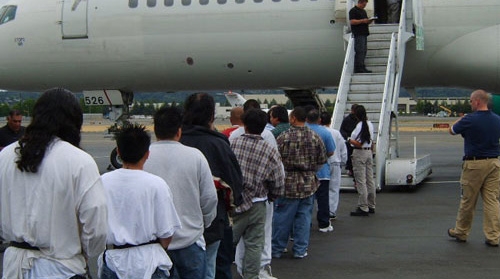Action to prevent his removal is necessary, and fortunately his case is getting a ton of press, but the answer is not a revision of the CCA2000. The answer is to work for fair and just comprehensive immigration reform in line with all other immigrant rights organizations and activists. In the meantime, advocates and activists should be asking for the quicker blanket deferred action for adoptees, modeled after the actions the DREAMers got the Obama administration to enact.
There are many problems with just amending the CCA2000. First, an amendment will not pass through both houses of Congress in time to save Adam. Second, I don't think that goes far enough, leaving too many still vulnerable to deportation, and lastly it takes away our choice about naturalizing.
Here's my proposal:
- Automatic immunity from deportation for all who were sent to the US to be adopted, including those whose adoptions were not finalized, and those who were not adopted like the babylift cases.
- The choice to naturalize without the criminal background and health checks
- Naturalization processing fees waived, including the biometrics and medical exam fees
- Return of deported people who had been sent to the US to be adopted
Of course the first and most pressing concern is protecting those who were sent to the US to be adopted from removal. We must remember that it is not only Koreans who will be affected by an amendment or change to intercountry adoption laws. This becomes even more pressing as the Guatemalan wave comes of age, as they will be most vulnerable to profiling as immigrants. Fortunately, the majority were admitted to the US on IR-3 visas, and they are covered under the current CCA, but there are some who will not be covered, as the rampant mishandling of the Guatemalan adoptions gives me little hope that they were all processed legally and fully. As Kathryn Joyce pointed out, a lot of the adoption happening from Latin America (including Haiti) and Africa were instigated by fundamental Christians with megafamilies, and in many cases little sophistication regarding immigration matters.
Furthermore, the Babylifts of Vietnam, Korea, Haiti, Cuba, etc. resulted in many children being sent to the US, ostensibly to be adopted, but many were left in foster care instead, and unnaturalized. These people need to be protected as well. Finally children and babies sent to be adopted but whose adoptions weren't finalized for any reason are not currently mentioned in either the original CCA2000 or amendment proposals.
Removing the choice of citizenship was one of the reasons cited when adoptees campaigned for dual citizenship with their adoptive countries and South Korea. They acknowledged that removing this choice was an injustice. Let's not advocate for the same injustice. Making U.S. citizenship automatic probably removes the choice for adoptees from other countries, not only those from ROK. However, we should advocate for removing the blocks impeding naturalization from those who do wish to change their citizenship. Many adoptees struggle financially or with medical conditions.
The current fees to naturalize include the naturalization application, biometrics (to prove identity), health screening, and other things like shipping, photos, and notaries. There are several medical conditions which could make a person inadmissible or disqualify her or him from naturalization such as communicable diseases, mental illnesses, and addiction.
The current laws also require anyone who has committed various misdemeanors or felonies from being ineligible for naturalization and can send them into removal proceedings. The Illegal Immigration Reform and Immigrant Responsibility Act of 1996 (IIRIRA1996) makes some offenses especially likely for adoptees deportable offenses, including voting without citizenship and claiming to be a citizen by applying for a US passport without being a citizen.
Like us, many DREAMers, adults who were brought to the US when they were children but who are now undocumented, got the right to stay in the US with work permission. They can get social security numbers and driver's licenses and join American society for the most part. Although this measure is volatile (the next administration can cancel it just as easily as Obama enacted it) it would "save" Adam. The experience that the DREAMers and immigrant rights' organizers have should be an asset to the adoption community, but we've repeatedly refused to support them or ask them for help.
Any legislative action should also allow those who already have been deported to return to the US. Currently about 30 publicized cases or so have resulted in people who were adopted or who were sent to the US to be adopted being removed. Let's not forget them.
SOURCES:
http://poundpuplegacy.org/deportation_cases
http://poundpuplegacy.org/deportation_cases
http://www.uscis.gov/iframe/ilink/docView/PUBLAW/HTML/PUBLAW/0-0-0-10948.html
http://www.alllaw.com/articles/nolo/us-immigration/what-expect-green-card-medical-exam.html
http://swampland.time.com/2013/07/09/explainer-why-it-costs-immigrants-680-to-apply-for-naturalization/

